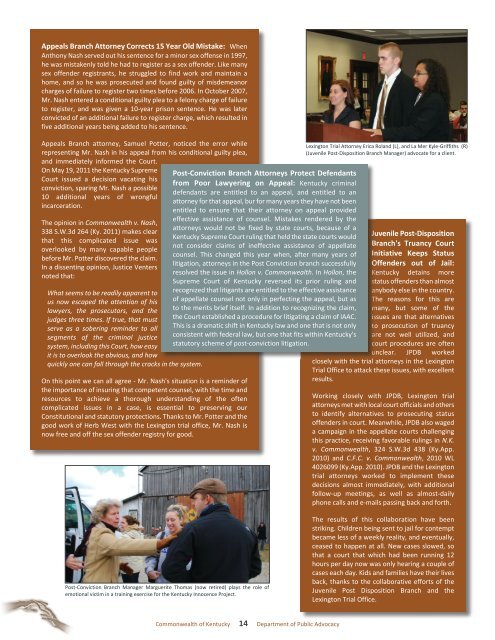DPA 2011 Annual Report - Department of Public Advocacy
DPA 2011 Annual Report - Department of Public Advocacy
DPA 2011 Annual Report - Department of Public Advocacy
You also want an ePaper? Increase the reach of your titles
YUMPU automatically turns print PDFs into web optimized ePapers that Google loves.
Appeals Branch Attorney Corrects 15 Year Old Mistake: When<br />
Anthony Nash served out his sentence for a minor sex <strong>of</strong>fense in 1997,<br />
he was mistakenly told he had to register as a sex <strong>of</strong>fender. Like many<br />
sex <strong>of</strong>fender registrants, he struggled to find work and maintain a<br />
home, and so he was prosecuted and found guilty <strong>of</strong> misdemeanor<br />
charges <strong>of</strong> failure to register two times before 2006. In October 2007,<br />
Mr. Nash entered a conditional guilty plea to a felony charge <strong>of</strong> failure<br />
to register, and was given a 10-year prison sentence. He was later<br />
convicted <strong>of</strong> an additional failure to register charge, which resulted in<br />
five additional years being added to his sentence.<br />
Appeals Branch attorney, Samuel Potter, noticed the error while<br />
representing Mr. Nash in his appeal from his conditional guilty plea,<br />
and immediately informed the Court.<br />
On May 19, <strong>2011</strong> the Kentucky Supreme<br />
Court issued a decision vacating his<br />
conviction, sparing Mr. Nash a possible<br />
10 additional years <strong>of</strong> wrongful<br />
incarceration.<br />
The opinion in Commonwealth v. Nash,<br />
338 S.W.3d 264 (Ky. <strong>2011</strong>) makes clear<br />
that this complicated issue was<br />
overlooked by many capable people<br />
before Mr. Potter discovered the claim.<br />
In a dissenting opinion, Justice Venters<br />
noted that:<br />
What seems to be readily apparent to<br />
us now escaped the attention <strong>of</strong> his<br />
lawyers, the prosecutors, and the<br />
judges three times. If true, that must<br />
serve as a sobering reminder to all<br />
segments <strong>of</strong> the criminal justice<br />
system, including this Court, how easy<br />
it is to overlook the obvious, and how<br />
quickly one can fall through the cracks in the system.<br />
On this point we can all agree - Mr. Nash's situation is a reminder <strong>of</strong><br />
the importance <strong>of</strong> insuring that competent counsel, with the time and<br />
resources to achieve a thorough understanding <strong>of</strong> the <strong>of</strong>ten<br />
complicated issues in a case, is essential to preserving our<br />
Constitutional and statutory protections. Thanks to Mr. Potter and the<br />
good work <strong>of</strong> Herb West with the Lexington trial <strong>of</strong>fice, Mr. Nash is<br />
now free and <strong>of</strong>f the sex <strong>of</strong>fender registry for good.<br />
Post-Conviction Branch Attorneys Protect Defendants<br />
from Poor Lawyering on Appeal: Kentucky criminal<br />
defendants are entitled to an appeal, and entitled to an<br />
attorney for that appeal, bur for many years they have not been<br />
entitled to ensure that their attorney on appeal provided<br />
effective assistance <strong>of</strong> counsel. Mistakes rendered by the<br />
attorneys would not be fixed by state courts, because <strong>of</strong> a<br />
Kentucky Supreme Court ruling that held the state courts would<br />
not consider claims <strong>of</strong> ineffective assistance <strong>of</strong> appellate<br />
counsel. This changed this year when, after many years <strong>of</strong><br />
litigation, attorneys in the Post Conviction branch successfully<br />
resolved the issue in Hollon v. Commonwealth. In Hollon, the<br />
Supreme Court <strong>of</strong> Kentucky reversed its prior ruling and<br />
recognized that litigants are entitled to the effective assistance<br />
<strong>of</strong> appellate counsel not only in perfecting the appeal, but as<br />
to the merits brief itself. In addition to recognizing the claim,<br />
the Court established a procedure for litigating a claim <strong>of</strong> IAAC.<br />
This is a dramatic shift in Kentucky law and one that is not only<br />
consistent with federal law, but one that fits within Kentucky's<br />
statutory scheme <strong>of</strong> post-conviction litigation.<br />
Post-Conviction Branch Manager Marguerite Thomas (now retired) plays the role <strong>of</strong><br />
emotional victim in a training exercise for the Kentucky Innocence Project.<br />
Commonwealth <strong>of</strong> Kentucky 14 <strong>Department</strong> <strong>of</strong> <strong>Public</strong> <strong>Advocacy</strong><br />
Lexington Trial Attorney Erica Roland (L), and La Mer Kyle-Griffiths (R)<br />
(Juvenile Post-Disposition Branch Manager) advocate for a client.<br />
Juvenile Post-Disposition<br />
Branch's Truancy Court<br />
Initiative Keeps Status<br />
Offenders out <strong>of</strong> Jail:<br />
Kentucky detains more<br />
status <strong>of</strong>fenders than almost<br />
anybody else in the country.<br />
The reasons for this are<br />
many, but some <strong>of</strong> the<br />
issues are that alternatives<br />
to prosecution <strong>of</strong> truancy<br />
are not well utilized, and<br />
court procedures are <strong>of</strong>ten<br />
unclear. JPDB worked<br />
closely with the trial attorneys in the Lexington<br />
Trial Office to attack these issues, with excellent<br />
results.<br />
Working closely with JPDB, Lexington trial<br />
attorneys met with local court <strong>of</strong>ficials and others<br />
to identify alternatives to prosecuting status<br />
<strong>of</strong>fenders in court. Meanwhile, JPDB also waged<br />
a campaign in the appellate courts challenging<br />
this practice, receiving favorable rulings in N.K.<br />
v. Commonwealth, 324 S.W.3d 438 (Ky.App.<br />
2010) and C.F.C. v. Commonwealth, 2010 WL<br />
4026099 (Ky.App. 2010). JPDB and the Lexington<br />
trial attorneys worked to implement these<br />
decisions almost immediately, with additional<br />
follow-up meetings, as well as almost-daily<br />
phone calls and e-mails passing back and forth.<br />
The results <strong>of</strong> this collaboration have been<br />
striking. Children being sent to jail for contempt<br />
became less <strong>of</strong> a weekly reality, and eventually,<br />
ceased to happen at all. New cases slowed, so<br />
that a court that which had been running 12<br />
hours per day now was only hearing a couple <strong>of</strong><br />
cases each day. Kids and families have their lives<br />
back, thanks to the collaborative efforts <strong>of</strong> the<br />
Juvenile Post Disposition Branch and the<br />
Lexington Trial Office.


